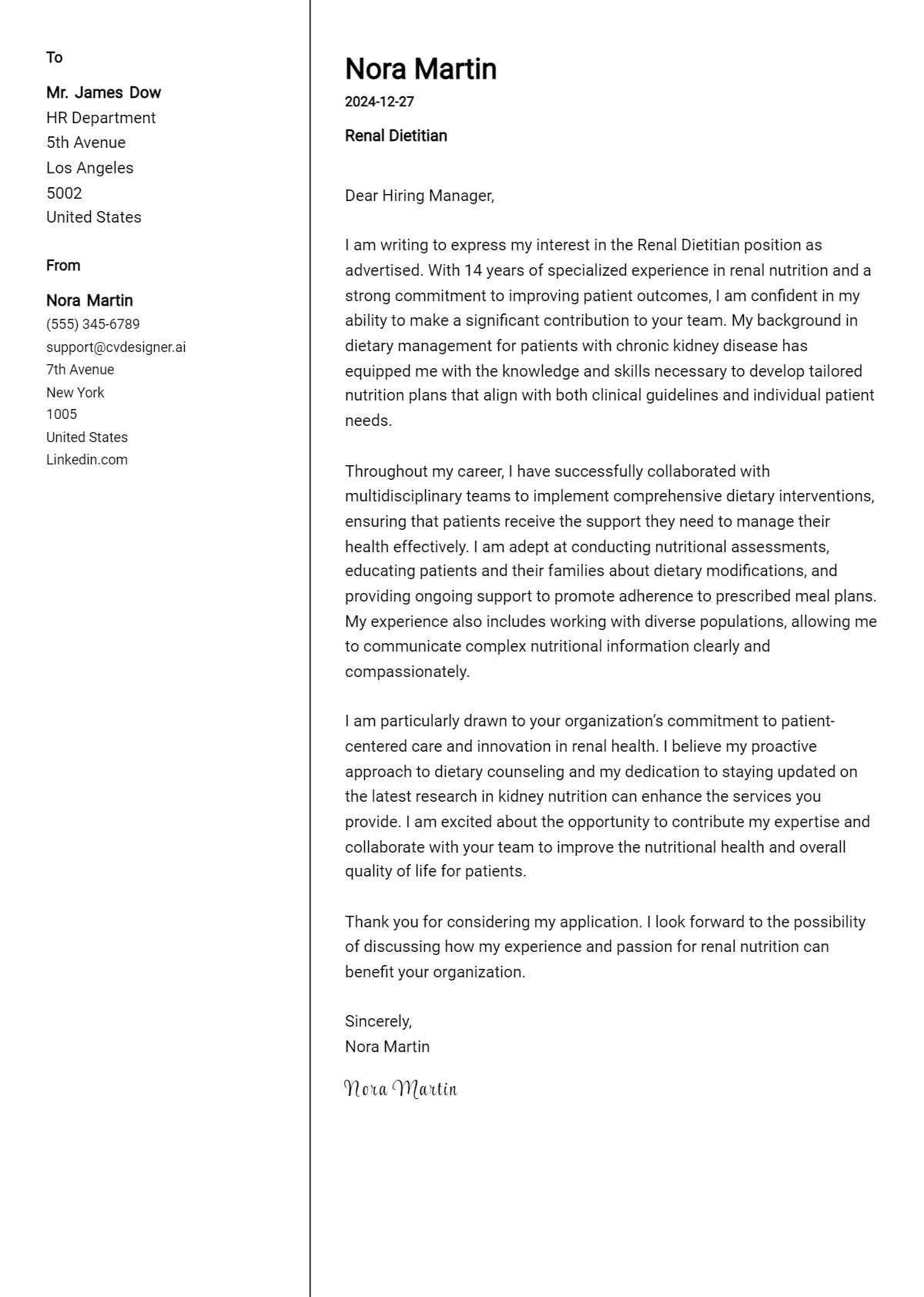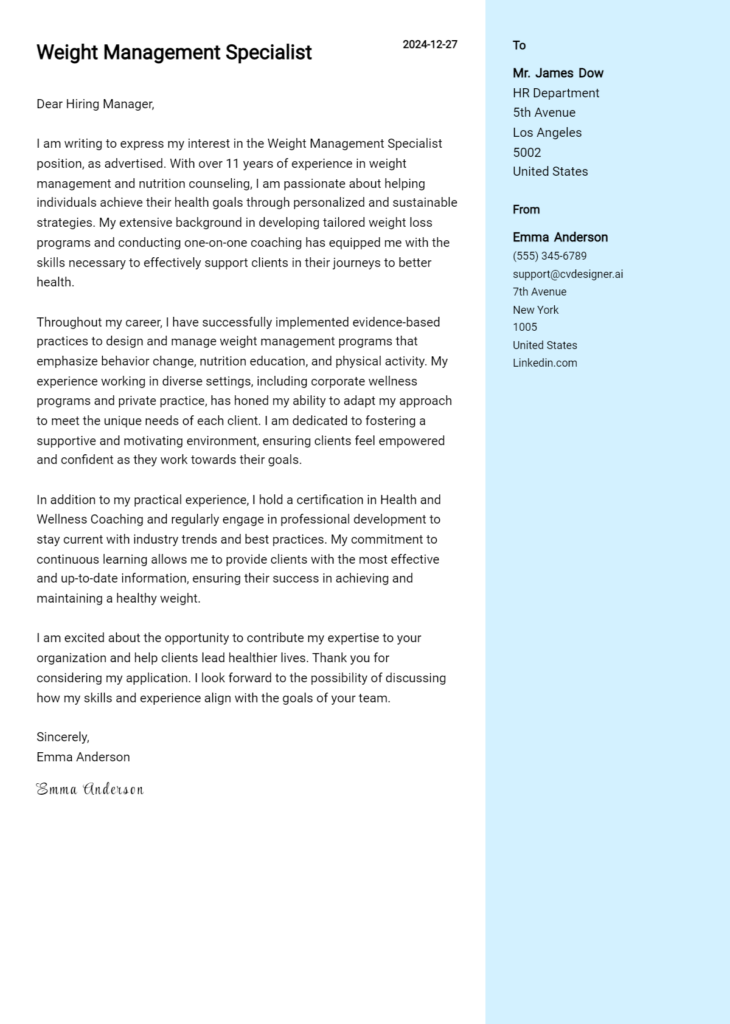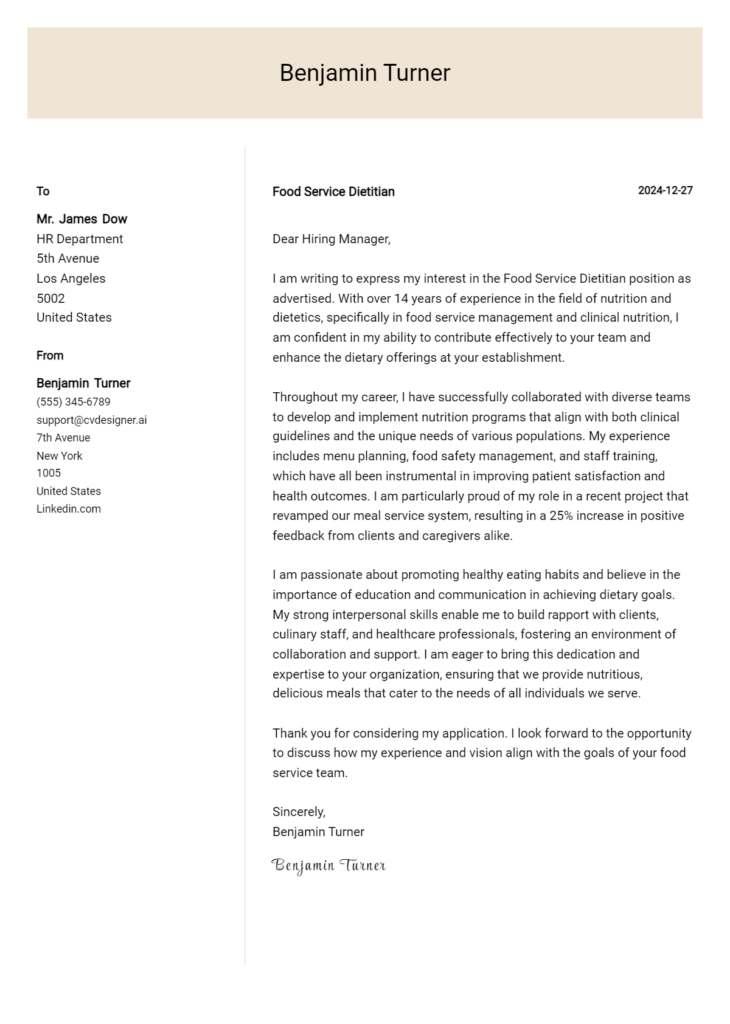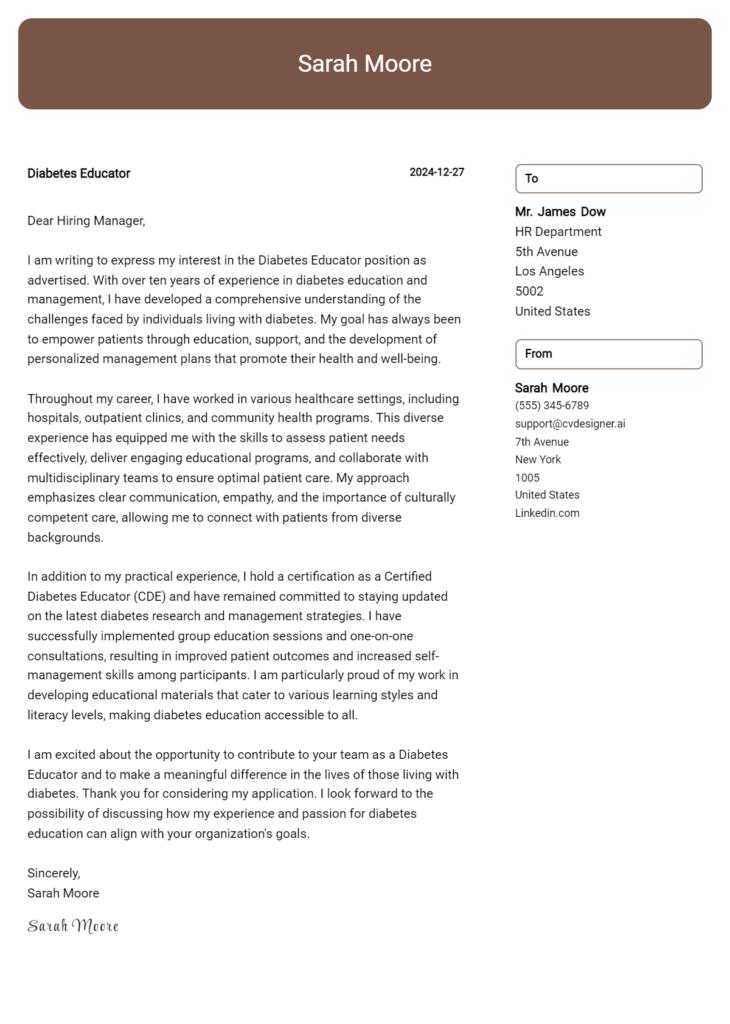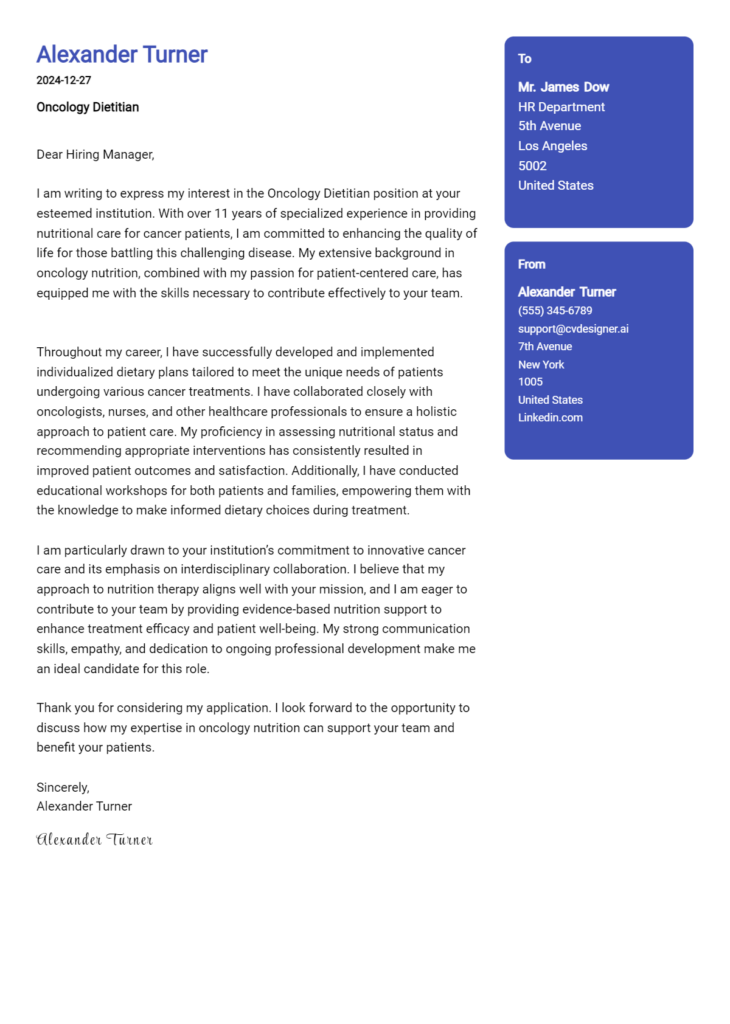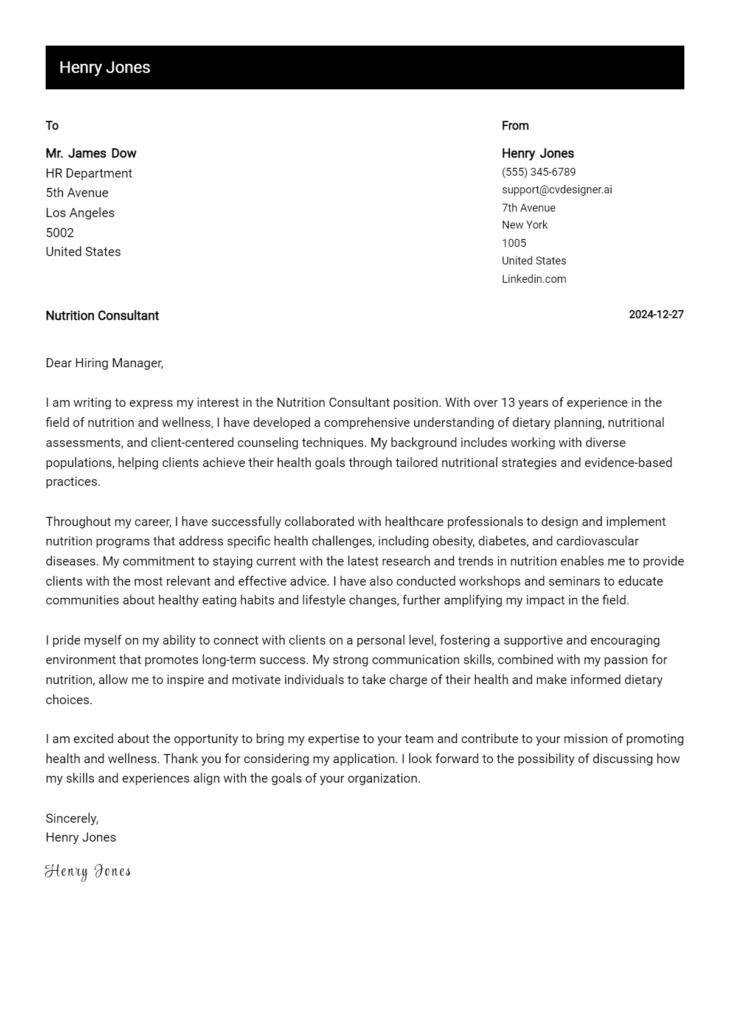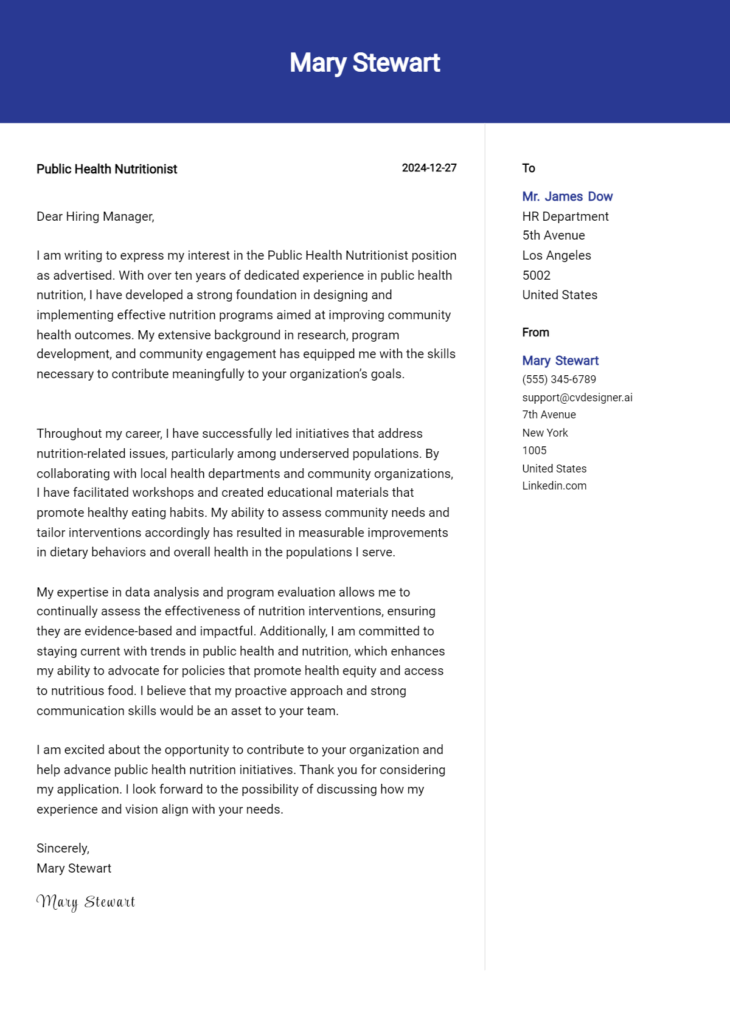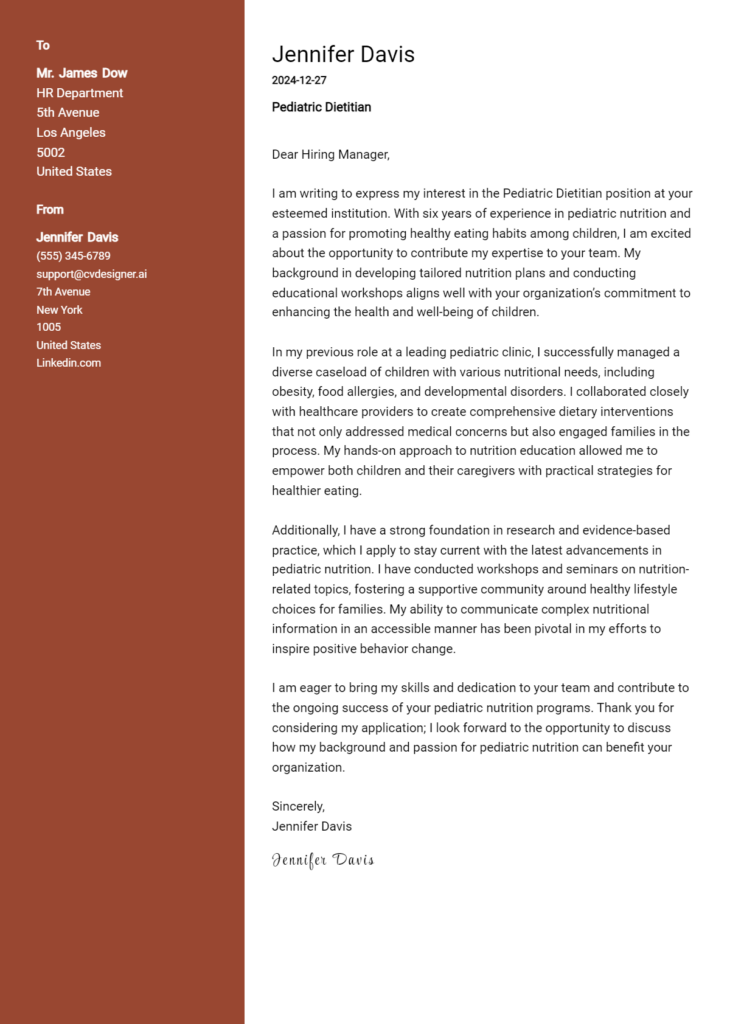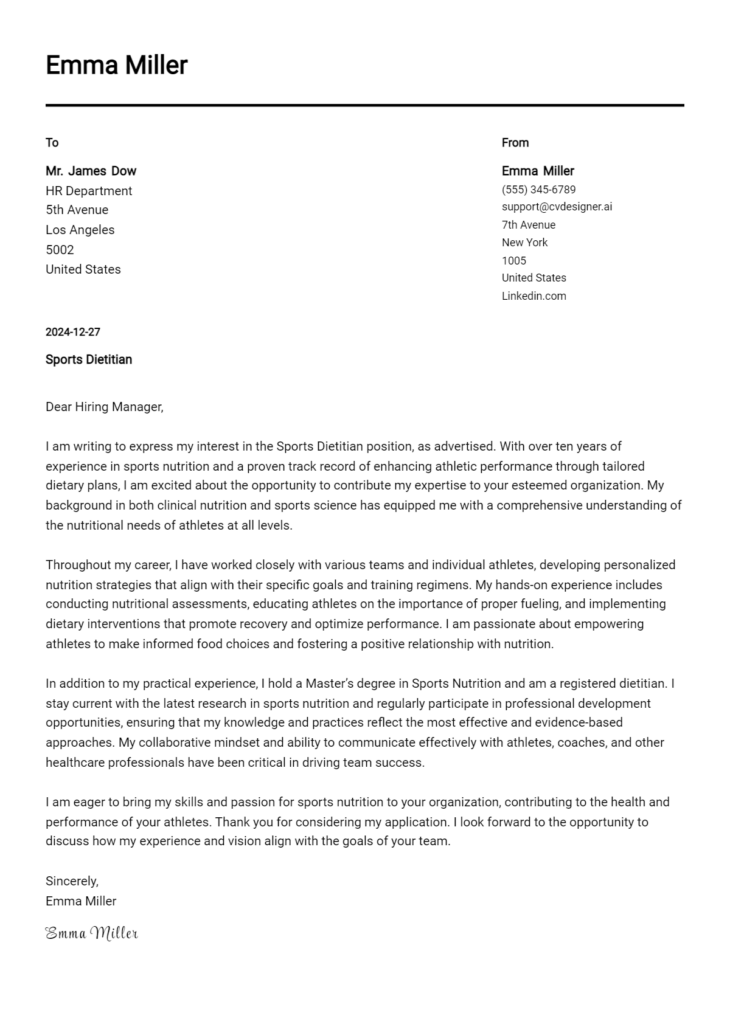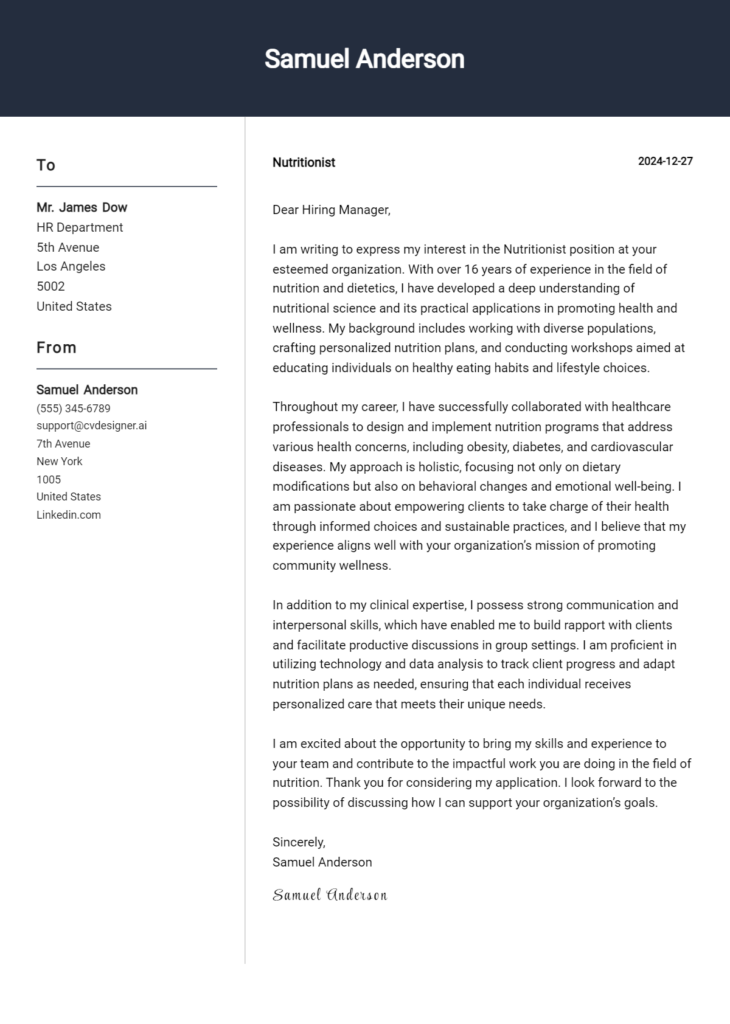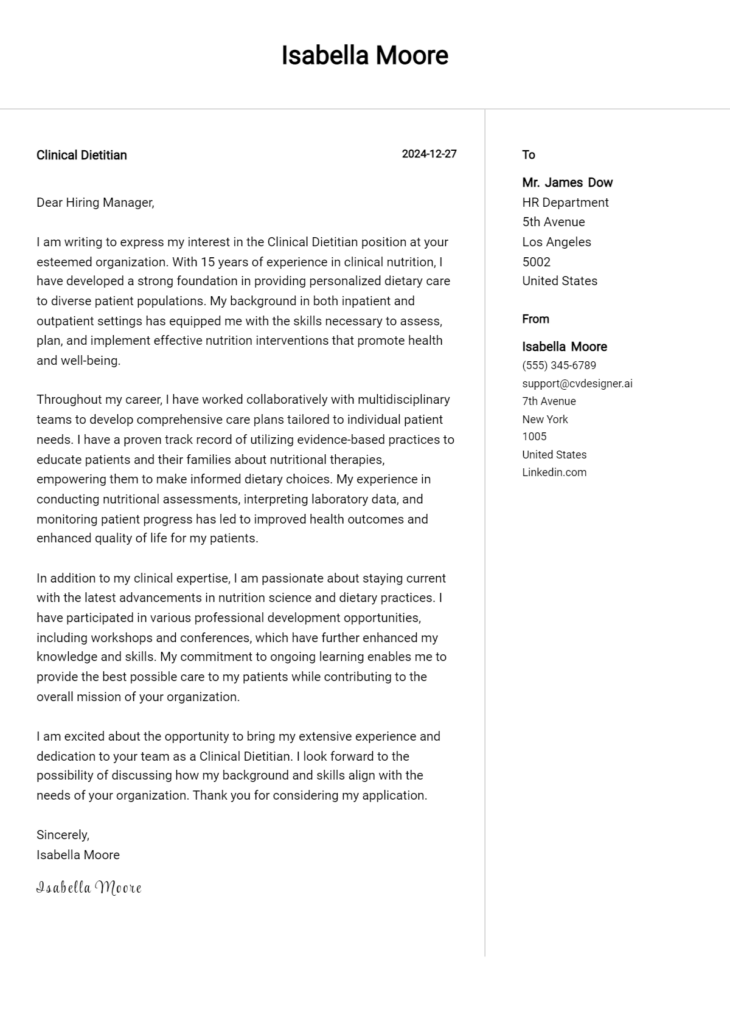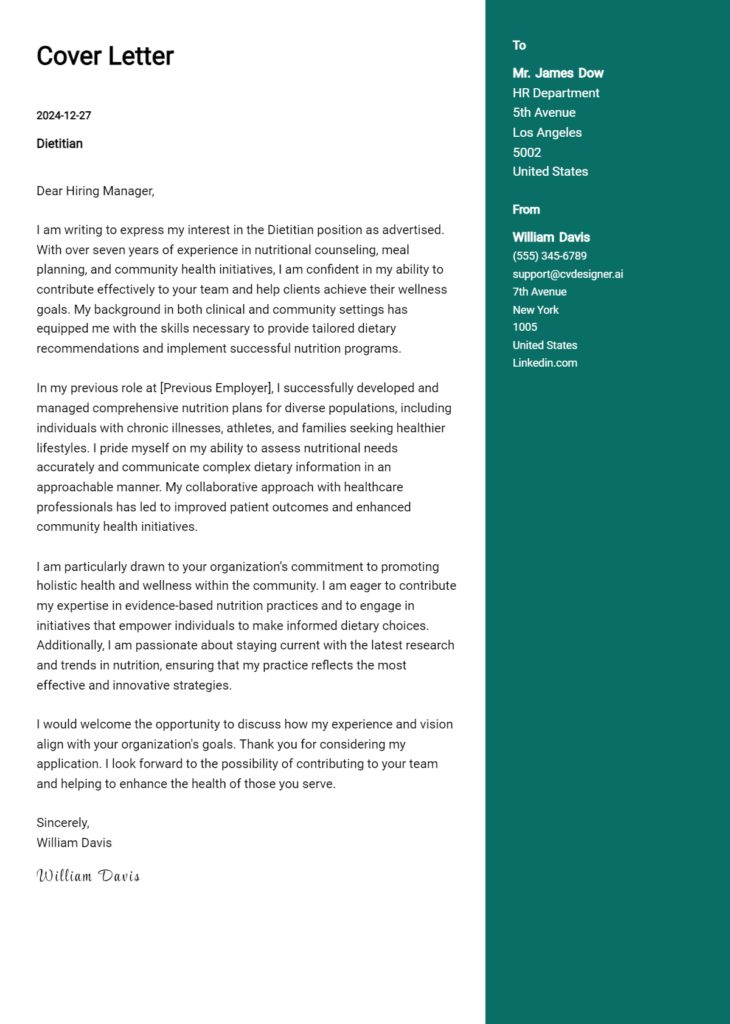Renal Dietitian Cover Letter Examples
Explore additional Renal Dietitian cover letter samples and guides and see what works for your level of experience or role.
How to Format a Renal Dietitian Cover Letter?
Crafting a well-structured cover letter is essential for a Renal Dietitian, as it showcases your expertise in nutrition and your ability to communicate effectively with patients and healthcare teams. Proper formatting not only enhances readability but also reflects your professionalism and attention to detail—critical attributes in the healthcare field. A meticulously formatted cover letter can capture the hiring manager's attention and convey your dedication to improving patient outcomes through tailored dietary plans.
In this guide, we will explore how to structure your cover letter, providing valuable insights and renal dietitian-specific examples to help you create a persuasive document.
We will focus on the essential components of a professional cover letter, including:
- Cover Letter Header
- Cover Letter Greeting
- Cover Letter Introduction
- Cover Letter Body
- Cover Letter Closing
Each section plays a vital role in presenting your qualifications and commitment to excellence. Let’s break down each part and learn how to make your renal dietitian cover letter stand out.
The Importance of a Cover Letter Header for a Renal Dietitian
A well-structured cover letter header is crucial for a Renal Dietitian as it sets the tone for the communication and establishes professionalism. The header should include essential information such as your contact details, the date, and the recipient's information. Clarity in this section ensures that your application is easily identifiable and reflects your attention to detail, which is vital in the healthcare field. A strong header not only showcases your professionalism but also helps to create a positive first impression.
Strong Example
Jane Doe, MS, RD, CSR 123 Health Lane Wellness City, ST 12345 (123) 456-7890 jane.doe@email.com October 15, 2023 Hiring Manager Renal Care Clinic 456 Kidney Way Health Town, ST 67890
Weak Example
jdoe@email.com October 15 Renal Clinic
The Importance of the Cover Letter Greeting
The greeting of a cover letter is crucial in establishing the tone for the rest of the document. It serves as the first point of contact between the applicant and the hiring manager, setting a professional yet personalized tone that can make a lasting impression. Addressing the hiring manager directly demonstrates your attention to detail and your genuine interest in the position, which is particularly important in specialized roles like a Renal Dietitian. To avoid sounding generic, it's essential to research and find the recipient's name whenever possible. This not only showcases your initiative but also helps you connect with the reader on a more personal level.
Strong Greeting Example
Dear Ms. Johnson,
Weak Greeting Example
To Whom It May Concern,
Importance of a Well-Crafted Cover Letter Introduction for a Renal Dietitian
A well-crafted cover letter introduction is crucial for a Renal Dietitian as it sets the tone for the entire application. This initial paragraph should not only capture the hiring manager's attention but also express the candidate’s genuine interest in the role. By briefly showcasing key skills or notable achievements, the introduction can create a compelling case for why the candidate is well-suited for the position. A strong introduction can make a lasting impression, while a weak one may leave the hiring manager unimpressed.
Strong Example
Dear [Hiring Manager's Name], I am excited to apply for the Renal Dietitian position at [Company Name], where I can leverage my 5 years of experience in providing specialized nutritional care for patients with chronic kidney disease. My passion for improving patient outcomes through tailored dietary plans has resulted in a 30% improvement in adherence among my clients. I am eager to bring my expertise and dedication to your team, contributing to the exceptional care that [Company Name] is known for.
Weak Example
Dear [Hiring Manager's Name], I am writing to apply for the Renal Dietitian job. I have some experience in this area and believe I could do a good job. I think I would fit in well with your team.
Purpose of the Cover Letter Body for a Renal Dietitian
The cover letter body for a Renal Dietitian serves to effectively showcase the candidate's unique skills, relevant experiences, and the value they can bring to the organization. This section should highlight specific projects or accomplishments, such as successful dietary interventions that improved patient outcomes, collaboration with healthcare teams, or contributions to patient education programs. By detailing these experiences, candidates can demonstrate their expertise in renal nutrition, their understanding of the complexities involved in managing kidney disease through diet, and their ability to enhance patient care. A compelling cover letter body can significantly strengthen a candidate's application by providing tangible evidence of their qualifications and enthusiasm for the role.
Strong Example
As a Renal Dietitian with over five years of experience in a clinical setting, I successfully implemented a comprehensive dietary intervention program that led to a 30% improvement in patient compliance with renal diet guidelines over two years. By collaborating closely with nephrologists and nursing staff, I developed individualized meal plans that addressed both nutritional needs and lifestyle preferences. Additionally, I initiated a series of patient education workshops that increased awareness of kidney health management, resulting in positive feedback from over 95% of participants. I am excited about the opportunity to bring my expertise and passion for patient-centered care to your team at [Company Name].
Weak Example
I have worked as a Renal Dietitian for a few years and have helped patients with their diets. I know a lot about food and nutrition, which is important for kidney health. I think I can help your company because I am dedicated to my work. I also like to work in a team and always try to do my best.
Importance of the Cover Letter Closing for a Renal Dietitian
The closing paragraph of a cover letter is crucial as it reinforces the applicant's qualifications, expresses enthusiasm for the position, and prompts the hiring manager to take action. A strong closing leaves a lasting impression, summarizes the candidate's unique skills relevant to renal nutrition, and encourages the employer to review the attached resume or schedule an interview. Conversely, a weak closing may come across as indifferent or unprofessional, potentially diminishing the applicant's chances of moving forward in the hiring process.
Strong Example
In conclusion, I am excited about the opportunity to contribute to your team as a Renal Dietitian, leveraging my expertise in renal nutrition and patient education to enhance the health outcomes of your patients. I believe that my experience in developing tailored dietary plans for individuals with chronic kidney disease aligns perfectly with your clinic's mission. I look forward to the possibility of discussing my application further and am eager to share how I can make a positive impact. Thank you for considering my application; I hope to hear from you soon to schedule an interview.
Weak Example
Thanks for reading my cover letter. I think I would be a decent fit for the Renal Dietitian role. I have attached my resume, so you can look at it if you want. Please let me know if you want to talk.
Crafting an effective cover letter is essential for candidates aspiring to excel as a Renal Dietitian. A well-structured cover letter not only highlights your technical skills and problem-solving abilities but also demonstrates your knowledge of the Software Development Life Cycle (SDLC), your capacity for teamwork, and your commitment to continuous learning. The following tips will guide you in showcasing these vital areas and help you stand out to potential employers.
Tips for Crafting an Effective Cover Letter
Highlight Technical Skills
Detail your expertise in renal nutrition, including your knowledge of dietary management for patients with chronic kidney disease. Mention specific areas such as electrolyte balance, fluid restrictions, and meal planning. Utilize metrics or examples to illustrate your proficiency, such as successful patient outcomes or dietary interventions.Showcase Problem-Solving Abilities
Use your cover letter to narrate instances where you successfully addressed complex dietary challenges. Describe a situation where you developed a personalized nutrition plan for a patient with unique health needs. This not only demonstrates your analytical skills but also your ability to think critically in high-pressure situations.Demonstrate SDLC Knowledge
If applicable, explain how your understanding of the Software Development Life Cycle applies to dietary software or tools you’ve used in your practice. Discuss any experience you have with electronic health records or nutrition management systems, and how you've leveraged technology to enhance patient care.Emphasize Teamwork and Collaboration
Illustrate your ability to work collaboratively with healthcare teams, including physicians, nurses, and other dietitians. Share examples of how you’ve contributed to multidisciplinary team meetings or care plans, emphasizing your communication skills and your role in ensuring comprehensive patient care.Express Passion for Continuous Learning
Convey your commitment to professional development by mentioning relevant certifications, workshops, or courses you’ve pursued. Highlight any memberships in professional organizations or attendance at conferences that keep you abreast of the latest research and trends in renal nutrition. This not only reflects your dedication but also assures potential employers of your proactive approach to learning.
For more help with your cover letter, consider exploring our cover letter templates or using our cover letter builder to create a polished and professional document.
Common Mistakes to Avoid in a Renal Dietitian Cover Letter
Crafting a compelling cover letter is essential for capturing the attention of potential employers, especially in specialized fields like renal dietetics. Avoiding common mistakes can significantly enhance your chances of success. Here are some pitfalls to watch out for:
Generic Greetings: Using a generic salutation like "To Whom It May Concern" can make your letter feel impersonal. Always try to find the name of the hiring manager.
Lack of Customization: Failing to tailor your cover letter to the specific job description can make you appear uninterested. Research the employer and incorporate relevant keywords and skills.
Overly Technical Language: While it's important to demonstrate your expertise, using excessively technical jargon can alienate the reader. Aim for clarity and accessibility.
Neglecting Formatting: A cluttered or unprofessional format can detract from your message. Following a clear cover letter format helps ensure your content is easy to read and visually appealing. Check out this guide on cover letter format for tips.
Repetitive Content: Simply reiterating your resume content can bore the reader. Use the cover letter to highlight your passion for renal dietetics and unique experiences.
Ignoring Proofreading: Spelling and grammatical errors can undermine your professionalism. Always proofread your letter, or ask a colleague to review it before sending.
Forgetting to Include a Call to Action: Concluding without a strong call to action may leave your reader unsure of your intentions. Clearly state your desire for an interview and express enthusiasm for the opportunity.
By avoiding these mistakes, you can create a standout cover letter that effectively communicates your qualifications for a renal dietitian position. For additional inspiration, consider reviewing various cover letter examples.
Cover Letter FAQs for Renal Dietitian
What should I include in my cover letter as a Renal Dietitian?
In your cover letter, focus on highlighting your qualifications relevant to renal nutrition. Start with a brief introduction about your professional background and your passion for renal care. Include your education, certifications, and any specialized training in nephrology or renal dietetics. Discuss your clinical experience, emphasizing your understanding of dietary restrictions and nutritional needs for patients with kidney disease. Mention specific skills such as patient education, interdisciplinary collaboration, and your ability to create personalized meal plans. Conclude by expressing your enthusiasm for the position and how you can contribute to the healthcare team.
How can I demonstrate my knowledge of renal nutrition in my cover letter?
To effectively demonstrate your knowledge of renal nutrition, provide examples of how you've applied this expertise in previous roles. Discuss specific cases where you've developed dietary interventions for patients with chronic kidney disease or those on dialysis. Include any experience with managing electrolyte imbalances and protein restrictions. Mention any research, presentations, or continuing education courses related to renal dietetics you’ve participated in. By illustrating your hands-on experience and commitment to staying updated on renal nutrition guidelines, you will convey your expertise to potential employers.
Should I tailor my cover letter for each job application?
Absolutely! Tailoring your cover letter for each application is crucial in showcasing your genuine interest in the specific position and organization. Research the employer’s mission, values, and patient demographics to align your skills and experiences with their needs. Highlight particular job requirements mentioned in the job posting, and address how your background and achievements make you a strong fit. Customizing your cover letter also demonstrates your attention to detail and willingness to invest time in the application process, which can set you apart from other candidates.
What tone should I use in my cover letter?
The tone of your cover letter should be professional yet personable. Aim for a balance between formality and warmth; you want to convey your expertise while also showcasing your passion for patient care. Use clear and concise language, avoiding jargon unless it's relevant to the renal dietitian role. Express enthusiasm for the opportunity and the organization you’re applying to, but maintain a level of professionalism throughout. An approachable tone can help establish a connection with the hiring manager, while a professional demeanor reinforces your qualifications and commitment to the field.
Build your Cover Letter in minutes
Use an AI-powered cover letter builder and have your letter done in 5 minutes. Just select your template and our software will guide you through the process.

